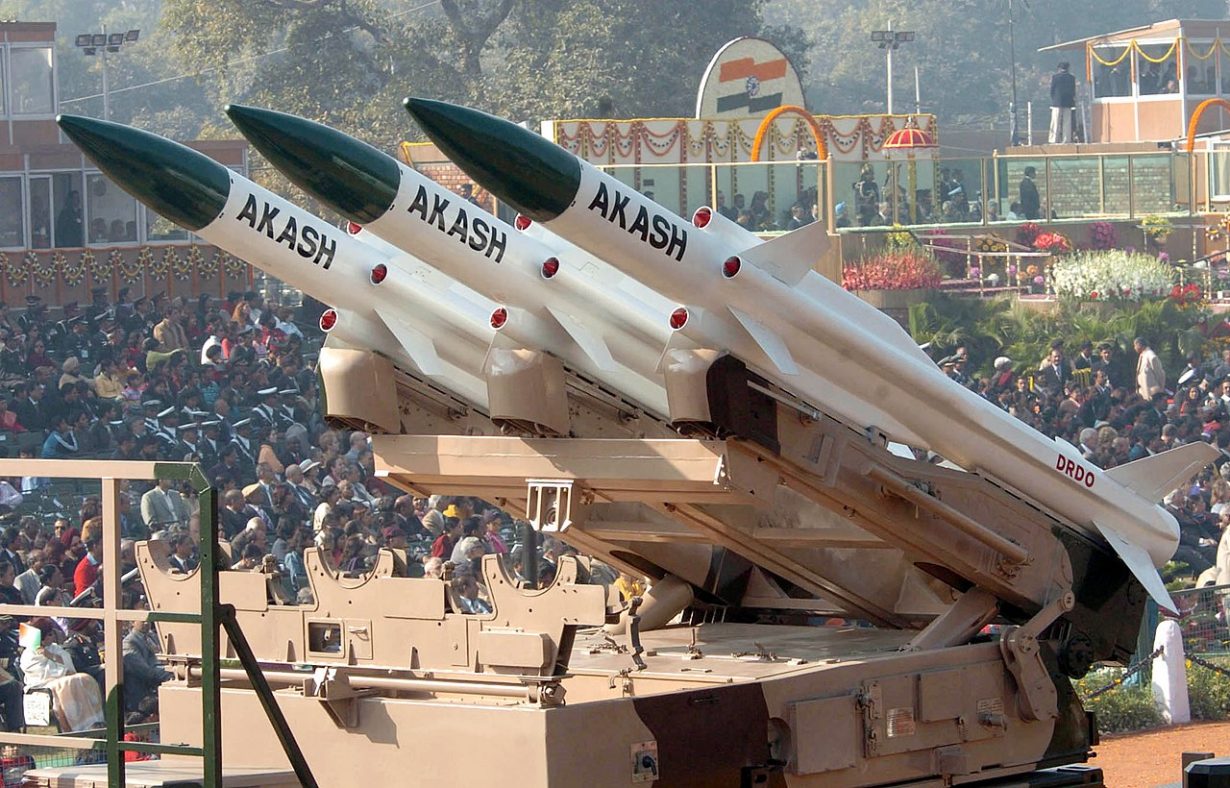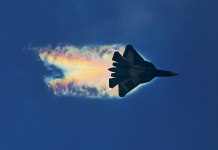Armenia has emerged as one of the biggest importers of Indian weapons. There have been reports that the country could acquire the Indian-built surface-to-air missile (SAM), Akash.
While no one confirms it officially because of the sensitivities involved, documents suggest that the order for the same has already been placed.
Akash is a short-range SAM system manufactured by Bharat Dynamics Limited (BDL) to protect vulnerable areas and points from air attacks. According to the BDL website, the Akash Weapon System (AWS) can simultaneously engage Multiple Targets in Group Mode or Autonomous Mode. It has built-in Electronic Counter-Counter Measures (ECCM) features. The entire weapon system is put atop mobile platforms.
It can effectively engage helicopters, fighter jets, and UAVs flying in the range of 4-25 kilometers. It is fully automatic with quick response time from target detection to kill.
It is highly immune to active and passive jamming. It can be transported swiftly via rail or road and can be deployed quickly. The project has an overall indigenous content of 82 percent, which will be increased to 93 percent by 2026-27.
The ICICI Securities newsletter on mutual funds gives an insight into BDL’s order book. Talking about “expanding its footprints in export,” the newsletter says that BDL has the largest proportion of exports in its order book. “Management expects revenue from exports at 25 percent by 2027 and further orders for Akash SAMs, lightweight torpedoes, SAAW, Konkur (ATGMS), CMDS, and Astra missiles (BRAAM),” reads the newsletter.
The word “further” in the statement is being seen as implying that BDL has already received export orders for the Akash SAM system and Armenia is seen as the most probable destination of the export. It was reported in October 2022 that Armenia, engaged in a bloody conflict with Azerbaijan, has been interested in procuring drones, loitering munitions, and the Akash missile system from India.
The Indian Army has already inducted two regiments of Akash SAMs and has placed orders for two more.
With its ability to engage multiple targets and destroy maneuvering targets such as unmanned aerial vehicles (UAVs), cruise missiles, and missiles launched from choppers, Akash is ideally suited for Yerevan’s requirement to combat the armed drones deployed by Baku.
Yerevan has also signed an MoU with France to purchase the Mistral short-range air defense system. Armenia has also purchased indigenous Pinaka multi-barrel rocket launchers, Konkurs anti-tank guided missiles, and a wide variety of ammunition, including 80-mm mortars, to counter Azerbaijan.
The EurAsian Times has earlier reported that after importing rocket launchers and missiles from India, Armenia is now importing an anti-drone system.
Most of the defense deals with the Caucasian country have been kept under wraps, but the news about them trickles in from the mandatory annual statements or the minutes of the meetings of the companies concerned. For instance, the news about Zen Technologies opening a branch office in Armenia came to light when the minutes of a board meeting held on October 28, 2023, were released.
The Hyderabad-based Zen Technologies is supplying an anti-drone system worth US $ 41.5 million to Armenia. Zen Anti-Drone System, a Counter Unmanned Aerial System (CUAS), is a multi-layer multi-sensor architecture that provides comprehensive security against drone attacks.
Armenia Finds A Reliable Partner In India
Armenia has almost doubled its defense investments over the last year. In 2022, the spending was around US$700 million to US$800 million; now, in 2024, it will be US$1.4 billion or US $1.5 billion.
For some time now, Yerevan has sought to diversify its arms imports and find new allies after Russia failed to provide the country with ordered weapons worth around US$400 million (it has not yet returned the money).
The failed arms deal was an additional trigger in the worsening Russia-Armenia relations, which made Armenia seek to diversify the sources of its arms imports, looking at the West and India.
Apart from giving repeat orders to Indian defense firms, Armenia has been looking to refurbish its Russian and Soviet weapons. Armenia is keen to modernize its military arsenal, primarily of Soviet and Russian origin. The country wants to learn how to upgrade Soviet and Russian equipment in its inventory and integrate it with the Western system.
Russia remains embroiled in a war with Ukraine and is unable to meet its defense exports commitment to Armenia. The weapons exported by India have already been inducted by the Indian Armed forces, bearing testimony to their efficacy.
The chairman of Armenia’s parliamentary committee on defense and security affairs, Andranik Kocharyan, recently stated without naming India, that the weapons purchased by Armenia have proven to be “very satisfactory,”

“Our news media, our people are discussing all day long what weapons were brought, from what country, where it was tested. The relevant division of the defense ministry is also testing this weaponry, and the tests are very satisfactory,” said Kocharyan.
A top Armenian security official and Secretary of the Security Council of Armenia, Armen Grigoryan, visited New Delhi on August 28, 2023, to meet with Indian Prime Minister Narendra Modi and National Security Advisor Ajit Doval. In light of this, it is said that India is contemplating the supply of a fresh batch of military equipment to Armenia.
There have been murmurs about Armenia’s interest in the BrahMos cruise missiles and the Israeli-Indian co-developed medium-range surface-to-air missile (MRSAM).
In 2022, India stepped up as a defense supplier to Armenia, embroiled in a protracted conflict with Azerbaijan. The first consignment of weapons was delivered last year via Iran.
Earlier, in January 2023, Azerbaijan President Ilham Aliyev called India’s supply of weapons to adversary Armenia an “unfriendly move,” adding: “If we are facing a serious threat, we will deal with that threat immediately, regardless of where that threat arises, within our territory or outside our borders. It is our legitimate right to do so.”
- Ritu Sharma has been a journalist for over a decade, writing on defense, foreign affairs, and nuclear technology.
- She can be reached at ritu.sharma (at) mail.com
- Follow EurAsian Times on Google News




